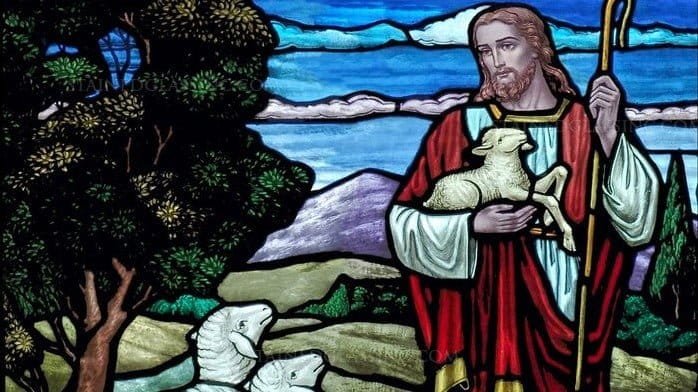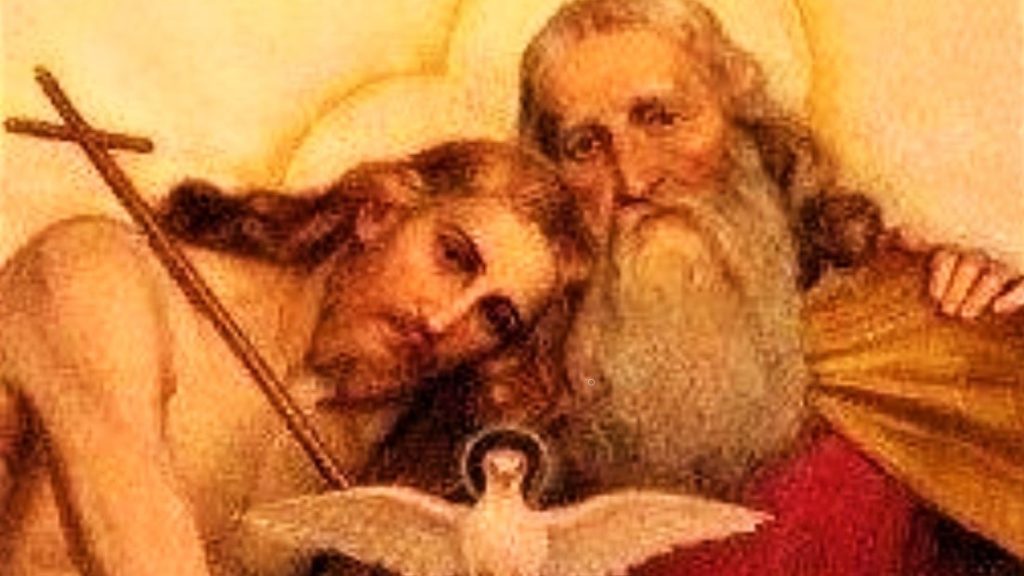MONDAY IN THE 4TH WEEK IN EASTER
DAILY GOSPEL COMMENTARY:
“I AM THE GATE OF THE SHEEP” Jn 10:1-10.
Gospel of Sunday, 4th week of Easter.
Jn 10:1-10

READING I
Acts 11:1–18
The Apostles and the brothers who were in Judea heard that the Gentiles too had accepted the word of God. So when Peter went up to Jerusalem the circumcised believers confronted him, saying, “You entered the house of uncircumcised people and ate with them.” Peter began and explained it to them step by step, saying, “I was at prayer in the city of Joppa when in a trance I had a vision, something resembling a large sheet coming down, lowered from the sky by its four corners, and it came to me. Looking intently into it, I observed and saw the four-legged animals of the earth, the wild beasts, the reptiles, and the birds of the sky. I also heard a voice say to me, ‘Get up, Peter. Slaughter and eat.’ But I said, ‘Certainly not, sir, because nothing profane or unclean has ever entered my mouth.’ But a second time a voice from heaven answered, ‘What God has made clean, you are not to call profane.’ This happened three times, and then everything was drawn up again into the sky. Just then three men appeared at the house where we were, who had been sent to me from Caesarea. The Spirit told me to accompany them without discriminating. These six brothers also went with me, and we entered the man’s house. He related to us how he had seen the angel standing in his house, saying, ‘Send someone to Joppa and summon Simon, who is called Peter, who will speak words to you by which you and all your household will be saved.’ As I began to speak, the Holy Spirit fell upon them as it had upon us at the beginning, and I remembered the word of the Lord, how he had said, ‘John baptized with water but you will be baptized with the Holy Spirit.’ If then God gave them the same gift he gave to us when we came to believe in the Lord Jesus Christ, who was I to be able to hinder God?” When they heard this, they stopped objecting and glorified God, saying, “God has then granted life-giving repentance to the Gentiles too.”
RESPONSORIAL PSALM
R. Athirst is my soul for the living God.
Or: Alleluia.
As the hind longs for the running waters,
so my soul longs for you, O God.
Athirst is my soul for God, the living God.
When shall I go and behold the face of God?
R. Athirst is my soul for the living God.
Or: Alleluia.
Send forth your light and your fidelity;
they shall lead me on
And bring me to your holy mountain,
to your dwelling-place.
R. Athirst is my soul for the living God.
Or: Alleluia.
Then will I go in to the altar of God,
the God of my gladness and joy;
Then will I give you thanks upon the harp,
O God, my God!
R. Athirst is my soul for the living God.
R. Athirst is my soul for the living God.
Or: Alleluia.
ALLELUIA
I am the good shepherd, says the Lord; I know my sheep and mine know me.
GOSPEL OF MONDAY IN THE 4TH WEEK IN EASTER
“I AM THE GATE OF THE SHEEP”
Jn 10:1–10
Jesus said: “Amen, amen, I say to you, whoever does not enter a sheepfold through the gate but climbs over elsewhere is a thief and a robber. But whoever enters through the gate is the shepherd of the sheep. The gatekeeper opens it for him, and the sheep hear his voice, as he calls his own sheep by name and leads them out. When he has driven out all his own, he walks ahead of them, and the sheep follow him, because they recognize his voice. But they will not follow a stranger; they will run away from him, because they do not recognize the voice of strangers.” Although Jesus used this figure of speech, they did not realize what he was trying to tell them.
So Jesus said again, “Amen, amen, I say to you, I am the gate for the sheep. All who came before me are thieves and robbers, but the sheep did not listen to them. I am the gate. Whoever enters through me will be saved, and will come in and go out and find pasture. A thief comes only to steal and slaughter and destroy; I came so that they might have life and have it more abundantly.”
GOSPEL COMMENTARY from the Navarre Bible, Commentary to the Gospel of St. John (with permission)
vv. 1-18 The image of the Good Shepherd recalls a favourite theme of Old Testament prophetic literature: the chosen people is the flock, and Yahweh is their shepherd (cf. Ps 23). Cf. as well: Jer (cf. 23:1-6; also 2:8; 3:15; 10:21; Is 40:1-11; Ezek 34] […]
Jesus presents himself as this shepherd who looks after his sheep, seeks out the strays, cures the crippled and carries the weak on his shoulders (cf. Mt 18:12-14; Lk 15:4-7), thereby fulfilling the ancient prophecies. Christian art found its inspiration in this touching image of the Good Shepherd, thereby leaving us a representation of Christ’s love for each of us.
- In addition to the title of Good Shepherd, Christ applies to himself the image of the door into the sheepfold of the Church. “The Church,” Vatican II teaches, “is a sheepfold, the sole and necessary gateway to which is Christ (cf. Jn 10:1-10). It is also a flock, of which God foretold that he himself would be the shepherd (cf. Is 40:11; Ezek 34:11ff.), and whose sheep, although watched over by human shepherds, are nevertheless at all times led and brought to pasture by Christ himself, the Good Shepherd and prince of shepherds (cf. Jn 10:11; 1 Pet 5:4), who gave his life for his sheep (cf. Jn 10:11-15)” (Lumen gentium, 6).
vv. 1-2: “Truly, truly, I say to you, he who does not enter the sheepfold by the door [gate] but climbs in by another way, that man is a thief and a robber; 2 but he who enters by the door is the shepherd of the sheep. 3 To him the gatekeeper opens; the sheep hear his voice, and he calls his own sh
- The flock can be harmed in a subtle, hidden way, or in a blatant way through abuse of authority. The history of the Church shows that its enemies have used both methods: sometimes they enter the flock in a secretive way to harm it from within; sometimes they attack it from outside, openly and violently.
- “Who is the good shepherd? ‘He who enters by the door’ of faithfulness to the Church’s doctrine and does not act like the hireling ‘who sees the wolf coming and leaves the sheep and flees’; whereupon ‘the wolf snatches them and scatters them’” (J. Escrivá, Christ is passing by, 34).
3-5 To him the gatekeeper opens; the sheep hear his voice, and he calls his own sheep by name and leads them out. 4 When he has brought out all his own, he goes before them, and the sheep follow him, for they know his voice. 5 A stranger they will not follow, but they will flee from him, for they do not know the voice of strangers.”
- In those times it was usual at nightfall to bring a number of flocks together into one sheepfold, where they would be kept for the night with someone acting as look-out. Then at dawn the shepherds would come back and open the sheepfold and each would call his sheep which would gather round and follow him out of the pen (they were used to his voice because he used call them to prevent them from going astray) and he would then lead them to pasture.
- Our Lord uses this image — one very familiar to his listeners — to teach them a divine truth:
- since there are strange voices around, we need to know the voice of Christ — which is continually addressing us through the Magisterium of the Church — and to follow it, if we are to get the nourishment our soul needs.
- “Christ has given his Church sureness in doctrine and a fountain of grace in the Sacraments. He has arranged things so that there will always be people to guide and lead us, to remind us constantly of our way. There is an infinite treasure of knowledge available to us: the word of God kept safe by the Church, the grace of Christ administered in the Sacraments and also the witness and example of those who live by our side and have known how to build with their good lives a road of faithfulness to God” (St. Josemaria, Christ is passing by, 34).
v. 6 This figure Jesus used with them, but they did not understand what he was saying to them.
- Christ develops and interprets the image of the shepherd and the flock, to ensure that everyone who is well-disposed can understand his meaning.
- But the Jews fail to understand — as happened also when he promised the Eucharist (Jn 6:41-43) and spoke of the “living water” (Jn 7:40-43), or when he raised Lazarus from the dead (Jn 11:45-46).
v. 7 So Jesus again said to them. “Truly, truly, I say to you, I am the door [gate] of the sheep.
- After describing his future Church through the image of the flock, Christ extends the simile and calls himself the “door of the sheep”. The shepherds and the sheep enter the sheepfold: both must enter through the door, which is Christ.
- “I”, St Augustine preached, “seeking to enter in among you, that is, into your heart, preach Christ: if I were to preach other than that, I should be trying to enter by some other way. Through Christ I enter in, not to your houses but to your hearts. Through him I enter and you have willingly heard me speak of him. Why? Because you are Christ’s sheep and you have been purchased with Christ’s blood” (In Ioann. Evang., 47, 2-3).
v. 8 All who came before me are thieves and robbers; but the sheep did not heed them.
- The severe reproach Jesus levels against those who came before him does not apply to Moses or the prophets (cf. Jn 5:39, 45; 8:56; 12:41), nor to the Baptist (cf. Jn 5:33), for they proclaimed the future Messiah and prepared the way for him.
- He is referring to the false prophets and deceivers of the people, among them some teachers of the Law — blind men and blind guides (cf. Mt 23:16-24) who block the people’s way to Christ, as happened just a little before when the man born blind was cured (cf. Jn 9).
VIDEO REFLECTION TOPIC: DO YOU LISTEN TO THE VOICE OF GOD BEFORE YOU ACT?
In today’s first reading, Peter tells the Jews who criticized him for associating with uncircumsized people, the Gentiles, that God spoke to him in a vision, a dream and then the Holy Spirit, not to discriminate but to tell the message of God.
In the gospel reading, Jesus likens himself to a shepherd, whose voice is enough to for the sheep to follow.
We reflect today on our being likened to sheep.
10-MINUTE MEDITATION PODCAST FOR YOUR MENTAL PRAYER
Stay updated: subscribe by email for free TO OUR NEW WEBSITE www.catholicsstrivingforholiness.org (PUT YOUR EMAIL IN THE SUBSCRIBE WIDGET).
We are also in www.fb.com/Catholicsstrivingforholiness. Kindly help more people in their Christian life by liking our page and inviting your family, friends and relatives to do so as well. Thanks in advance and God bless you and your loved ones! Fr. Rolly Arjonillo
